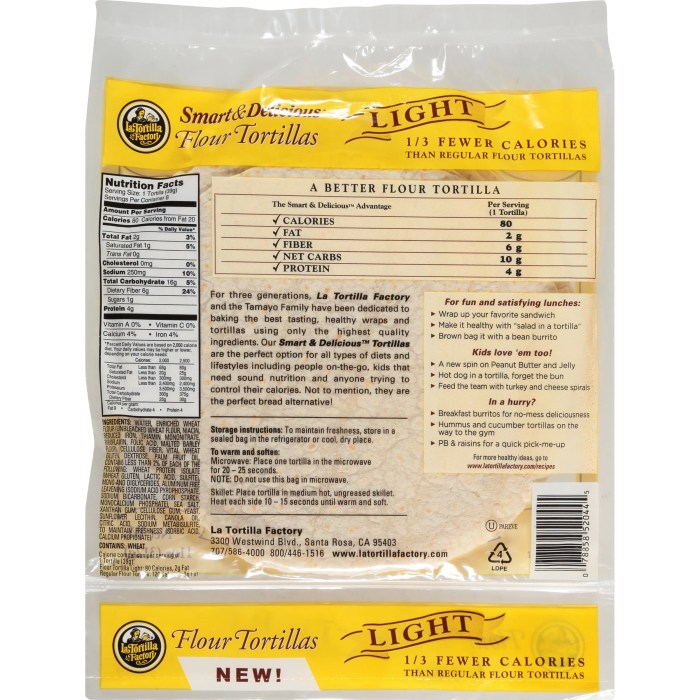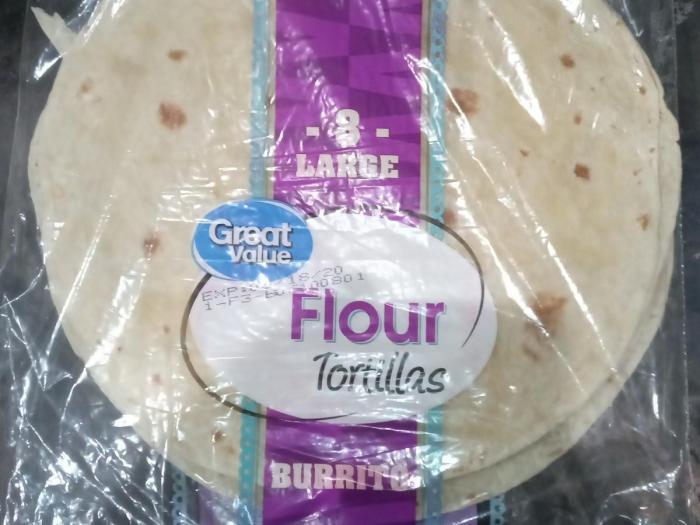Flour Tortillas in a Balanced Diet: Flour Tortilla Nutrition Facts

Flour tortilla nutrition facts – Flour tortillas, a staple in many cuisines, can easily be incorporated into a balanced diet when consumed mindfully. Understanding their nutritional profile and making smart choices about portion sizes and accompanying foods is key to maximizing their benefits. They offer a convenient and versatile way to enjoy a variety of meals and snacks.Flour tortillas, while offering carbohydrates for energy, should be considered part of a larger balanced meal plan that includes protein, healthy fats, and plenty of fruits and vegetables.
Overconsumption can lead to excess carbohydrate intake, potentially contributing to weight gain. Therefore, paying attention to portion sizes is crucial.
Nutritional Comparison with Other Bread Alternatives
Flour tortillas, whole-wheat tortillas, pita bread, and whole-wheat bread each offer varying nutritional profiles. Generally, whole-wheat options provide more fiber, which aids digestion and promotes satiety, leading to better blood sugar control. Whole-wheat tortillas and whole-wheat bread usually boast higher fiber and protein content compared to their refined flour counterparts. Pita bread, depending on the type, can offer a similar nutritional profile to flour tortillas.
However, the nutritional content varies greatly depending on the brand and ingredients used. For example, a whole-wheat tortilla might offer significantly more fiber than a white flour tortilla. It’s always best to check the nutrition labels for specific comparisons.
Examples of Healthy Meals and Snacks Using Flour Tortillas, Flour tortilla nutrition facts
Including flour tortillas in a healthy diet is straightforward. The key is to pair them with nutrient-rich ingredients.
Flour tortillas, a staple in many cuisines, offer a relatively low-calorie option compared to bread. However, nutritional content varies greatly depending on size and ingredients. For a different breakfast perspective, you might want to check out the nutritional breakdown of english muffin nutrition facts , which can be surprisingly similar in some aspects, particularly regarding carbohydrate content.
Ultimately, choosing between flour tortillas and english muffins often comes down to personal preference and dietary goals.
- Breakfast Burrito Bowl: Scrambled eggs with black beans, salsa, avocado, and a small whole-wheat tortilla, crumbled on top for added texture.
- Lunch Wrap: Grilled chicken or fish with mixed greens, hummus, and chopped vegetables wrapped in a small whole-wheat tortilla.
- Dinner Quesadillas: Black beans, cheese, and roasted vegetables in a whole-wheat tortilla, grilled until golden brown. Serve with a side salad.
- Snack: A small whole-wheat tortilla with a thin layer of guacamole and sliced tomatoes.
These examples highlight how flour tortillas can be a part of balanced and satisfying meals. The portion size of the tortilla is key; opting for smaller tortillas or only using a portion of a larger one can help manage calorie intake.
Selecting Flour Tortillas with Improved Nutritional Profiles
Choosing tortillas with improved nutritional profiles involves careful label reading. Look for:
- Whole wheat tortillas: These offer more fiber and nutrients compared to white flour tortillas.
- Lower sodium options: Many brands offer reduced-sodium versions, beneficial for those watching their sodium intake.
- Minimal added ingredients: Opt for tortillas with a shorter ingredient list, avoiding excessive sugars or unhealthy fats.
By paying attention to these factors, you can make informed choices and incorporate flour tortillas into your diet in a healthy and balanced way.
Nutritional Considerations and Concerns

Flour tortillas, while a convenient and versatile food, require mindful consumption due to their nutritional profile. Understanding their potential drawbacks alongside their benefits is crucial for incorporating them healthily into your diet. Over-reliance on flour tortillas, particularly those made with refined grains, can lead to several health concerns.
Refined Carbohydrates and Health Concerns
Excessive consumption of refined carbohydrates, the primary component of flour tortillas, can contribute to several health issues. Refined carbohydrates are quickly digested, leading to rapid spikes in blood sugar levels. This can increase the risk of developing type 2 diabetes, insulin resistance, and weight gain. Furthermore, a diet high in refined carbohydrates and low in fiber can negatively impact gut health and contribute to inflammation throughout the body.
Choosing whole-wheat tortillas or those made with other whole grains can significantly mitigate these risks, as the added fiber promotes slower digestion and steadier blood sugar levels.
Impact of Added Ingredients
The nutritional value of flour tortillas can be significantly altered by added ingredients. Many commercially produced tortillas contain preservatives, which, while extending shelf life, may not be beneficial to health in the long run. Some brands may also include trans fats, which are particularly harmful to cardiovascular health and should be avoided whenever possible. Always check the ingredient list carefully and opt for tortillas with minimal added ingredients and no trans fats.
Look for tortillas made with simple ingredients like flour, water, and perhaps a touch of salt.
Flour Tortillas and Weight Management
Flour tortillas can play a role in weight management, but only when consumed mindfully. Their high carbohydrate content means they contribute significantly to daily calorie intake. Large portions or frequent consumption can easily lead to weight gain. To manage weight effectively while incorporating flour tortillas, portion control is key. Choose smaller tortillas, fill them with nutrient-rich ingredients like vegetables and lean protein, and limit the amount of high-fat additions like cheese or sour cream.
Consider incorporating whole-wheat tortillas for increased fiber and satiety.
Comparison of Nutritional Information Across Brands
The nutritional content of flour tortillas varies significantly across brands. This table compares the nutritional information of four popular brands, highlighting key differences in ingredients and values. Remember that these values are approximate and may vary slightly depending on the specific product and size.
| Brand | Calories per Tortilla | Total Fat (g) | Sodium (mg) |
|---|---|---|---|
| Brand A | 80 | 2 | 150 |
| Brand B | 75 | 1.5 | 120 |
| Brand C | 90 | 3 | 180 |
| Brand D (Whole Wheat) | 95 | 2.5 | 160 |
Q&A
Are flour tortillas gluten-free?
No, traditional flour tortillas are made from wheat flour and therefore contain gluten. Gluten-free options are available, but it’s crucial to check the label.
How many calories are in a typical flour tortilla?
The calorie count varies depending on size and brand, but a standard 6-inch tortilla typically contains around 70-100 calories.
Can I use flour tortillas for weight loss?
Flour tortillas can be part of a weight-loss diet, but portion control is essential. Opt for whole wheat varieties for increased fiber and satiety.
What are the best brands of flour tortillas for nutrition?
Many brands offer healthier options; look for those with whole wheat flour, minimal added ingredients, and lower sodium content. Checking nutrition labels is key.



